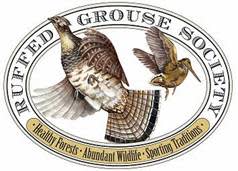Ruffed Grouse Society to Host 2013 Upland Bird Hunt in Northern Maine
Ruffed Grouse Society 09.03.13

Following an extremely successful hunt last fall, the Ruffed Grouse Society (RGS) has once again chosen Northern Maine for its second annual grouse and woodcock hunt. Held out of the New EnglandOutdoorCenter, Fire Road 20D, Millinocket, Maine on October 2-5, 2013, the guided hunt is limited to ten hunters.
According to RGS regional director Tripp Way, registration is $850 per gun and consist of a “Meet and Greet” reception party on Wednesday at 7 p.m., three breakfasts, two field lunches and two dinners — which includes a lobster or steak repast Friday evening. Hunting hours will run from 8:30 a.m. – 4 p.m., Friday and Saturday. Lodging will be at The Twin Pines Cabins, which has a spectacular view of MillinocketLake and Mt.Katahdin.
“Wednesday’s meet and greet will provide information on the terrain, followed by a Q&A session with RGS regional biologist Andy Weik,” Way said, adding that hunters are encouraged to bring their own dog or they can hunt with huntsmen’s dogs.
A 50-percent deposit is required by September 21, 2013, with remaining payment due prior too, or at the event. All major credit cards accepted and, with the exception of a $100 cancellation fee, refunds will be provided before September 27, 2013.
For more information and/or registration contact Mark Gray at 207-299-4172. Way can be reached at 607-743-0760; Weik at 607-793-4832.
Reservation forms can also be downloaded from the Internet at: www.ruffedgrousesociety.org/UserFiles/File/13AugustaMEMillinocketHunt.pdf.

